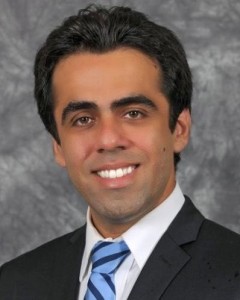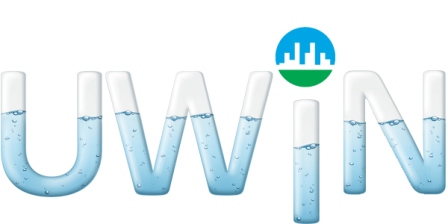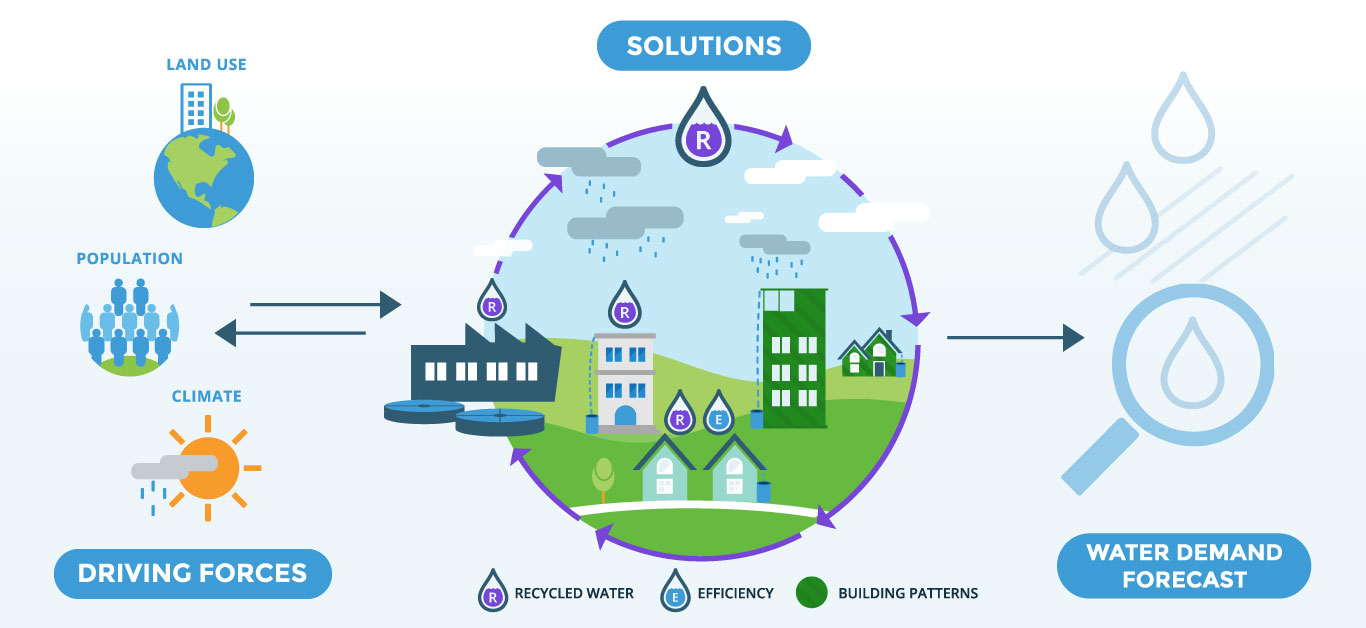Project B1-1a: Application of the Integrated Urban Water Model to Evaluate Strategies for Urban Water Demand Reduction
Sybil Sharvelle, PhD
Colorado State University
Civil & Environmental Engineering
Water supply and demand assessment under alternative climate, land use and population scenarios is an area of great interest among urban planners and water managers. The Integrated Urban Water Model was developed for urban water demand and savings forecasting with urban water conservation and recycling practices. The purpose of the mass balance model is to allow evaluation of alternative urban water management strategies under varying climatic conditions at a municipal or regional scale.
IUWM has been deployed as an online tool and as a web service, thus enabling accessibility, ease of use and applicability at the municipal scale.
IUWM facilitates the development of urban water demand forecasts through automated retrieval of publicly available data inputs through a geographical information system (GIS) interface, thus relieving the need for manual input of data.
Indoor residential demands are forecast based on end-use at the census block level with population and household data retrieved from the United States census. Combined residential/commercial, industrial, and institutional (CII) irrigation demands are forecast based on daily evapotranspiration and land cover data.
Water management strategies included in IUWM are:
- Indoor conservation
- Irrigation conservation
- Graywater reuse for toilet flushing and irrigation
- Stormwater capture and use
- Wastewater treatment plant effluent reuse
- Fit-for-purpose water supplies
- Water supply diversification
DATA NEEDS
- Indoor water use separated by residential and CII (5 – 10 years duration)
- Outdoor water use separated by residential and CII (5 – 10 years duration)
- Shapefile for service area for which data is provided
DATA USE
Historical indoor and outdoor water use will be used to calibrate IUWM to the modeled city and verify forecasts of indoor and outdoor demand. This will enable estimation of baseline conditions so that scenarios of water demand reduction, population change, land use change and climate change can be evaluated.
Tools & Technologies
Integrated Urban Water Model
The Integrated Urban Water Model (IUWM) is a high-level planning tool that allows urban planners and water managers to consider potable water savings of indoor and outdoor conservation measures, and alternative water sources such as graywater, stormwater, and reclaimed water.
IUWM is GIS-enabled and utilizes land use designations, lot size, census data, climate information, soil characteristics and allows the user to tailor scenarios of adoption of conservation measures and alternative water sources to determine the impact on potable water demands for various land use configurations. IUWM is a mass balance model that has been developed based upon studies such as the Residential End Use Study and other well-known studies of residential use and can perform analysis from census block groups to watershed scales
IUWM has sophisticated graphing capabilities that allow the user to evaluate the impact of land-use configurations, changes in climate, conservation programs, and alternative water sources on water supply demands. The graphing tools can be tailored to the user’s needs and exported along with the raw data.
More information: https://erams.com/catena/tools/urban-planning/urban-water-demand-forecasting/
Community Life Cycle Assessment for Stormwater Infrastructure Tool (CLASIC)
The CLASIC tool serves as a screening tool utilizing a lifecycle cost framework to support stormwater infrastructure decisions on extent and combinations of green, hybrid green-gray and gray infrastructure practices. The tool is hosted on the eRAMS platform so that it will be geographical information system (GIS) interfaced and include interaction with national databases to upload data for the modeled area. There are three main components to the CLASIC tool outputs; life cycle costs (LCC), triple bottom line analysis (TBL) and performance (hydrologic and water quality). CLASIC is currently undergoing beta testing by user groups and will be posted as a publicly available web tool in 2019.
More information: https://clasic.erams.com/
Books/Chapters
Sharvelle, S. E. (2020) Water Quality for Decentralized Use of Non-Potable Water Sources. Water Quality Contributions for Women Engineers and Scientists. Springer, Edited by Deborah O’Bannon, Springer
Journal Articles
- Alja’fari, Jumana, Sybil Sharvelle, Nichole E. Brinkman, Michael Jahne, Scott Keely, Emily A. Wheaton, Jay Garland, Claire Welty, Michael C. Sukop, Thomas Meixner (2022) Characterization of Roof Runoff Microbial Quality in Four U.S. Cities with Varying Climate and Land Use Characteristics, Water Research, 2022:119123. https://doi.org/10.1016/j.watres.2022.119123
- Chinnasamy, C. V., Arabi, M., Sharvelle, S., Warziniack, T., Furth, C. D., & Dozier, A.(2021). Characterization of municipal water uses in the contiguous United States. Water Resources Research, 57, e2020WR028627. https://doi.org/10.1029/2020WR028627
- Cole, J., S. Sharvelle, D. Fourness, N. Grigg, L. Roesner, J. Haukaas (2017). Evaluation of Centralized and Decentralized Strategies for Dual Water Supply: A Case Study. ASCE Journal of Water Resources Planning and Management, 144(1): 05017017.
- Cole, J., Sharvelle, S., Grigg, N. S., Pivo, G., Haukaas, J. (2018). Collaborative, Risk-Informed, Triple Bottom Line, Multi-Criteria Decision Analysis Planning Framework for Integrated Urban Water Management. Water, 10(12), 1722. https://doi.org/10.3390/w10121722
- Cole, J., Sharvelle, S., Arabi, M. (2022) Assessing uncertainty in the evaluation of centralized and decentralized dual water supply strategies. Journal of Water Resources Planning and Management 148(12) https://doi.org/10.1061/(ASCE)WR.1943-5452.0001572
- Daigger, G. T., Sharvelle, S. E., Arabi, M., Love, N. G. (2019). Progress and Promise: Transitioning to the One Water/Resource Recovery Integrated Urban Water Management Systems. Journal of Environmental Engineering, 145(10):04019061. https://doi.org/10.1061/(ASCE)EE.1943-7870.0001552
- Lackey, Katy, S. Sharkey, S. Sharvelle, P. Kehoe, T. Chang (2019) Decentralized Water Reuse: Implementing and Regulating Onsite Non-Potable Water Systems, accepted with revisions. Journal of Sustainable Water and the Built Environment. 6(1):02519001. https://doi.org/10.1061/JSWBAY.0000891
- Luthy, R. G., Sharvelle, S. E., Dillon, P. (2019) Urban Stormwater for Enhancing Water Supply Environmental Science and Technology, 53:10. DOI: 1021/acs.est.8b05913
- Neale, M.R., Sharvelle, S.E., Arabi, M., Dozier, A., Goemans, C. (2020) Assessing Tradeoffs of Strategies for Urban Water Conservation and Fit for Purpose Water, Journal of Hydrology X, 8(2020), 0251900. https://doi.org/10.1016/j.hydroa.2020.100059
- Rasoulkhani, K., Mostafavi, A., Sharvelle, S., and Cole, J. (2019). “Resilience-Based Infrastructure Planning and Asset Management: Study of Dual and Singular Water Distribution Infrastructure Performance Using A Simulation Approach.” Sustainable Cities and Society, Vol. 48, 101577, https://doi.org/10.1016/j.scs.2019.101577
- Sharvelle, S., A. Dozier, M. Arabi, B. Reichel (2017). A Geospatially-Enabled Web Tool for Urban Water Demand Forecasting and Assessment of Alternative Urban Water Management Strategies. Environmental Modelling and Software, DOI: 10.1016/j.envsoft.2017.08.009.
Updated: November 2022
News Articles
“Report Shows Benefits, Risks of Stormwater and Graywater” Colorado State University – SOURCE, December 2015.
“A new strategy for drought-stressed cities: graywater recycling” – The Conversation, March 2016.
Theses/Dissertations
Batista, Giovana das Gracas (2018) “Characterization of Urban Water Use and Performance Evaluation of Conservation Practices Using the Integrated Urban Water Model in SÃO PAULO, Brazil”, M.S. Thesis, Civil and Environmental Engineering, Colorado State University, Fort Collins, Colorado. Web: https://hdl.handle.net/10217/193176
Cole, Jeanne (2018) “A Collaborative Planning Framework for Integrated Urban Water Management: A Case Study of City of Fort Collins, Colorado”, PhD Dissertation, Civil and Environmental Engineering, Colorado State University, Fort Collins, Colorado. Web: https://hdl.handle.net/10217/193125
Neale, Michael R. (2019). Assessing Tradeoffs of Urban Water Demand Reduction Strategies. MS Thesis: Civil and Environmental Engineering, Colorado State University. Web: https://hdl.handle.net/10217/199880
Patel, S. (2021) “Assessing Benefits and Consequences of Water Conservation and for Fit-for-Purpose Water Systems”, MS Thesis: Civil and Environmental Engineering, Colorado State University. Web: https://hdl.handle.net/10217/219559
Wostoupal, Benjamin (2018) “Exploring water management tradeoffs in semiarid regions through conservation, institutions, and integrated modeling”, M.S. Thesis, Civil and Environmental Engineering, Colorado State University, Fort Collins, Colorado. Web: https://hdl.handle.net/10217/191277
Updated: May 2021
Related Materials
- Research Project Overview Webinar (2018)
- UWIN B1-1 CSU Project Overview
- UWIN B1-1 (TAMU) Project Overview
- UWIN B1-2 Overview
- Integrated Urban Water Model User Guide
- Using Graywater and Stormwater to Enhance Local Water Supplies An Assessment of Risks, Costs and Benefits
Sybil Sharvelle, PhD – Principal Investigator
Associate Professor
Civil and Environmental Engineering
Colorado State University
Voice: (970) 491-6081
Email: sybil.sharvelle@colostate.edu
Dr. Sharvelle has nine years of experience working on graywater projects. Her graduate studies were funded by NASA to optimize biological waste processing systems that would treat graywater with the end goal of potable reuse. The waste treatment concept employed entailed separate source collection and treatment of graywater, urine, and fecal material. Dr. Sharvelle’s experience in closed loop recycling of resources is very valuable for implementation of sustainable development concepts for urban water management. Dr. Sharvelle is currently working on sustainable urban water management including graywater reuse, reclaimed water reuse, development of models to estimate water savings associated with urban water conservation practices. Dr. Sharvelle also has several years of experience working on waste conversion to methane through anaerobic digestion.
 Ali Mostafavi, PhD – Co-Principal Investigator
Ali Mostafavi, PhD – Co-Principal Investigator
Assistant Professor
Zachary Dept. of Civil Engineering
Texas A&M University
Voice: (979) 845-4856
Email: amostafavi@civil.tamu.edu
Dr. Mostafavi’s research interests focus on solving the challenges at the interface of the infrastructure systems, economy, environment and society. These problems are often large in scale and multidisciplinary, thereby requiring solution concepts that consider engineering and science simultaneously. Specialties include: Infrastructure-Energy-Environment nexus analysis, Sustainability and resilience of infrastructure systems, complex system simulation, risk analysis and modeling, financial analysis and modeling, business strategy, innovation assessment, policy analysis, decision making, and construction management.


